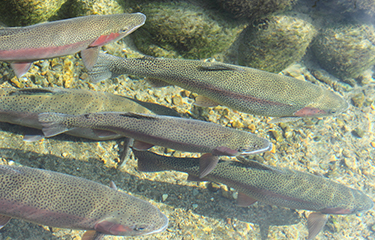Cooke Aquaculture has moved a step closer to ensuring a long-term presence in Washington State after the Washington Department of Fish and Wildlife (WDFW) confirmed earlier this week that it plans to issue a five-year marine aquaculture permit to the Canadian aquaculture company to farm all-female rainbow trout at its existing farms in Puget Sound.
Washington lawmakers voted to phase out and ban non-native finfish net-pen farming in the state following the 2017 collapse of a Cooke farm that released at least 250,000 Atlantic salmon into Puget Sound. If Cooke does not repurpose its salmon farms, they will be shut down by 2022.
The WDFW is accepting comments on the proposal until 22 October and has signaled that the department will not issue the permits until the public comments period has ended.
“Given the escape of Atlantic salmon in 2017, we know that there is a heightened sense of concern around the impacts of fish aquaculture in Puget Sound,” WDFW Fish Program Director Kelly Cunningham said. “We want to hear from the public about Cooke Aquaculture’s proposal and our proposed permit requirements.”
According to state documents, Cooke’s plan to use “mono-sex and sterile” rainbow trout, which are native to Washington, will “significantly reduce potential genetic integration with natural population.”
The WDFW will not require Cooke to produce an environmental impact statement because the new farms “will likely not have a significant adverse impact on the environment.” According to Cooke, no modifications will be needed to transition the sites from salmon farms to trout farms.
Cooke plans to procure eggs from Washington-based company Troutlodge, which has been selling rainbow trout eggs for over 70 years.
Jeanne McKnight, the executive director of the Northwest Aquaculture Alliance, a trade group representing the Pacific Northwest's aquaculture sector, praised Washington's move to allow Cooke to shift its production to rainbow trout.
“We commend the state, particularly WDFW, for going the extra mile to ensure fairness in making this important decision. We are grateful that science has won the day over politics, and we are delighted that Cooke will be able to continue producing sustainable seafood in Washington state, particularly in areas where family-wage jobs are desperately needed," McKnight said. “Aquaculture currently provides more than half of the seafood consumed worldwide - and that percentage is increasing as global demand for seafood continues to rise and wild fisheries are fully exploited. Not only does aquaculture produce much-needed heart-healthy protein, but it also makes seafood affordable for people who may not be able to purchase it otherwise.”
In a separate announcement on 3 October, Cooke announced a joint venture with the Jamestown S'Klallam Tribe to grow sablefish (black cod) and sterile triploid, all-female rainbow trout in a farm lease in Port Angeles, Washingon.
Cooke lost the lease for the farm in December 2017 after a series of regulatory violations were discovered at the site. The JV will require reinstatement of the lease, according to a press release.
“The Jamestown S’Klallam Tribe is known for being progressive and forward-thinking in its approach to resource management and economic development,” Cooke Inc. CEO Glenn Cooke, the owner of Cooke Aquaculture Pacific, said in the release.. “We look forward to working together to produce top quality seafood for consumers in Washington and across the U.S.”







